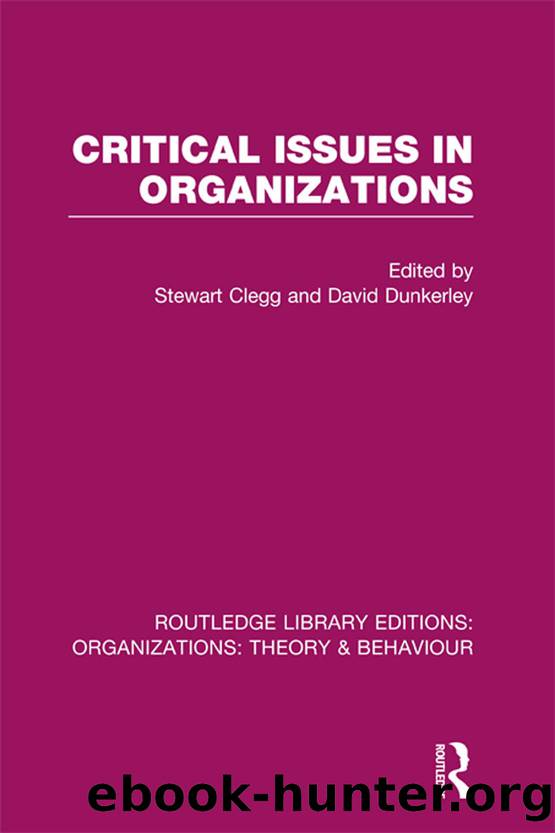Critical Issues in Organizations (RLE: Organizations) by Clegg Stewart;Dunkerley David;

Author:Clegg, Stewart;Dunkerley, David;
Language: eng
Format: epub
ISBN: 1186464
Publisher: Taylor & Francis Group
Chapter 5
ORGANIZATION AND PROTECTION
Arthur McCullough and Michael Shannon
INTRODUCTION
The analytical framework of modern organizational theory views organizations and the state as separable, rational, self-conscious and self-determining entities: they can interact voluntarily, without protection and without loss. This paper begins by formulating the main assumptions of organizational analysis.
Against the dissociated view of the state and its limited definition, the paper emphasizes its protective functions that developed historically in relation to organizations, and argues that all organizational transactions have been conditioned by state protective power which always remains present in one form or another.
Protective power in relation to organizations is clearly revealed when it fails to operate legitimately, for example in Northern Ireland. In such cases the functions and roles of many organizations tend to change in ways that cannot be explained by organizational theories. It is suggested that so far as historical analysis of the protective power of states can be advanced, the possibilities of the disintegration and emergence of organizations will crucially relate to the character of withdrawal or intrusion of protective administrative, military, or legal apparatuses.
The study of organization today does not usually imply very much about nationalism, colonialism, imperialism, absolutism, feudalism, capitalism, revolution, war, indeed any large-scale changes of civilization in the modern â not to speak of the ancient â world. Much of contemporary social science, according to the introduction to a recent book on capitalist agriculture in the sixteenth century,
has become the study of groups and organizations, when it has not been social psychology in disguise. This work however, involves not the study of groups, but of social systems. When one studies a social system, the classical lines of division within social science are meaningless. Anthropology, economics, political science, sociology â and history â are divisions of the discipline anchored in a certain liberal conception of the state and its relation to functional and geographical sectors of the social order. They make a certain limited sense if the focus of one's study is organizations (Wallerstein, 1974, p.11).
Whether there is a liberal conception here or a tradition of some kind, would be rather difficult to say, although it is fairly certain that one can probably grasp the bulk of organizational theorizing in terms of a loose outline of assumptions and presuppositions that will be outlined below.
In the first place it would hardly be an exaggeration to say that the themes related to modern organizations bear a striking resemblance to the vision that western political thinking had of individuals in the eighteenth century. That is to say, organizations can be roughly considered as contracting parties, effectively free to enter or not to enter into any particular exchanges. They will not generally enter into any exchange unless they benefit from it and co-operation can therefore be achieved without coercion. The organization is seen as almost morally complete at birth and not depending upon submission to authority or dominance to provide its identity, moral purpose or completion. Rather, its existence begins when 'explicit procedures are established to co-ordinate the activities of a group in the interest of achieving specified objectives' (Blau, 1968).
Download
This site does not store any files on its server. We only index and link to content provided by other sites. Please contact the content providers to delete copyright contents if any and email us, we'll remove relevant links or contents immediately.
The Brazilian Economy since the Great Financial Crisis of 20072008 by Philip Arestis Carolina Troncoso Baltar & Daniela Magalhães Prates(139994)
International Integration of the Brazilian Economy by Elias C. Grivoyannis(111064)
The Art of Coaching by Elena Aguilar(53255)
Flexible Working by Dale Gemma;(23293)
How to Stop Living Paycheck to Paycheck by Avery Breyer(19731)
The Acquirer's Multiple: How the Billionaire Contrarians of Deep Value Beat the Market by Tobias Carlisle(12331)
Thinking, Fast and Slow by Kahneman Daniel(12310)
The Radium Girls by Kate Moore(12033)
The Art of Thinking Clearly by Rolf Dobelli(10490)
Hit Refresh by Satya Nadella(9140)
The Compound Effect by Darren Hardy(8975)
Tools of Titans by Timothy Ferriss(8402)
Atomic Habits: Tiny Changes, Remarkable Results by James Clear(8349)
Turbulence by E. J. Noyes(8055)
A Court of Wings and Ruin by Sarah J. Maas(7853)
Change Your Questions, Change Your Life by Marilee Adams(7786)
Nudge - Improving Decisions about Health, Wealth, and Happiness by Thaler Sunstein(7711)
How to Be a Bawse: A Guide to Conquering Life by Lilly Singh(7490)
Win Bigly by Scott Adams(7202)
